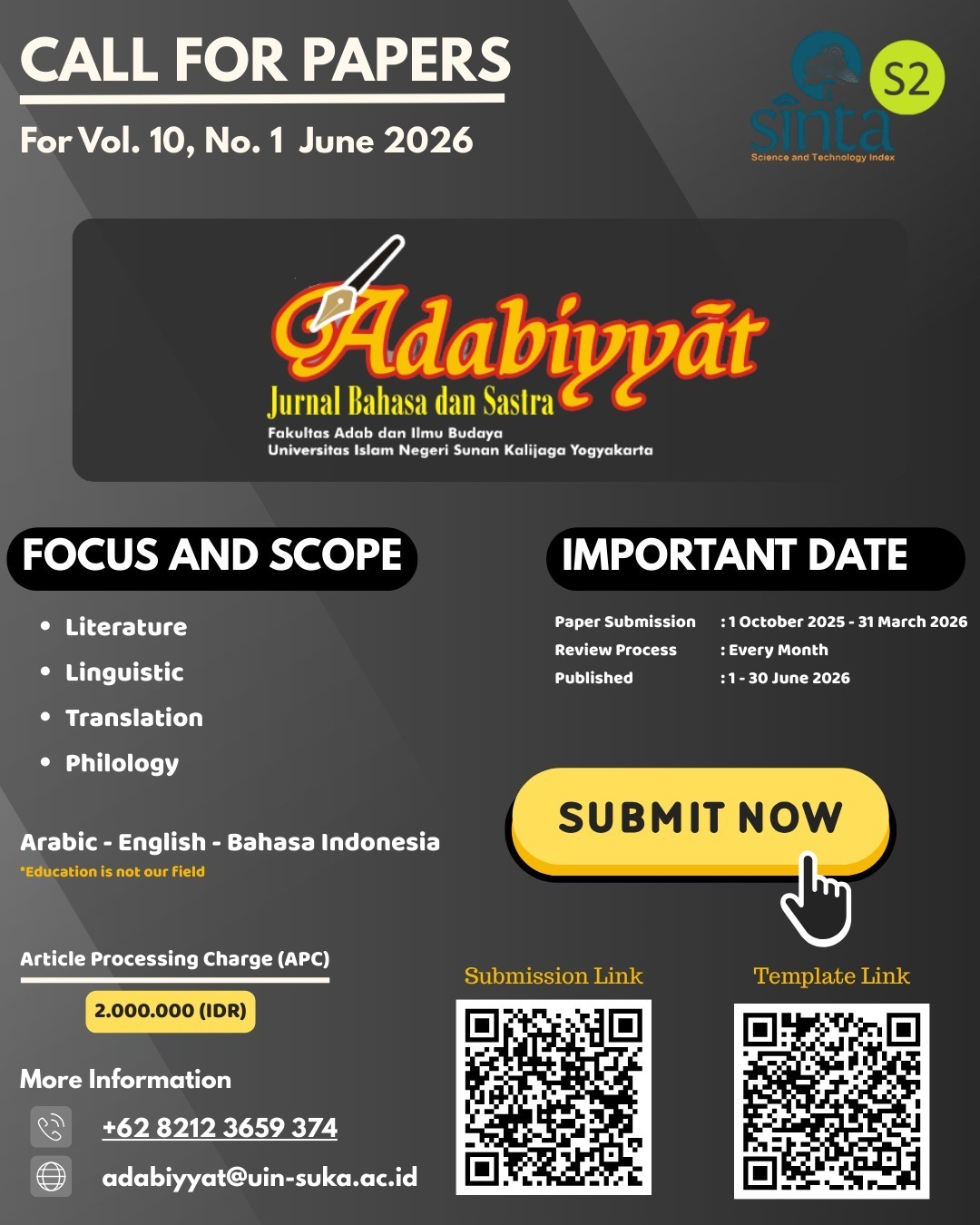MASKULINITAS DAN KESALEHAN DALAM NOVEL PEREMPUAN BERKALUNG SORBAN KARYA ABIDAH EL-KHALIEQY
DOI:
https://doi.org/10.14421/ajbs.2019.03203Keywords:
masculinities, piety, novelAbstract
Identifying the correlation between masculinities and piety in Abidah El-Khalieqy’s Perempuan Berkalung Sorban [A Woman in a Turban] is a way to understand how gender works within a particular culture. As masculinity is not a monolithic concept, the mode of its correlation with piety varies. Based on the analysis of the characters and their characterizations in the novel, it is found that, from the perspective of the female narrator, the practice of piety leads to victimization and oppression of women when it is inscribed with hegemonic masculinity and vice versa. By applying narratology, this research is able to reveal the discursive practices from the combination of masculinities and piety. Khudori is a new kind of character which shares a positive masculinity dreamt by moslem women although his maculinity resembles the non-hegemonic ones. The other kinds of masculinity in this novel that function as a contrast show that the combination of piety and hegemonic masculinity is not desirable. On a structural side, Khudori is created as a part of the structural aspects which serves as a dramatic functionality that fits him best to be a flat character.
Downloads
References
Adawiyah, Rabiyatul. 2012. “Analisis Pesan Dalam Film Perempuan Berkalung Sorban; Perspektif Gender.” Kafa`ah: Journal of Gender Studies 2 (2): 97–115. https://doi.org/10.15548/jk.v2i2.57.
Arat, Zehra F. Kabasakal, dan Abdullah Hasan. 2018. “Muslim Masculinities: What Is the Prescription of the Qur’an?” Journal of Gender Studies 27 (7): 788–801. https://doi.org/10.1080/ 09589236.2017.1316246.
Aryanika, Septa. 2016. “An Analysis of Perempuan Berkalung Sorban Novel: Feminist Perspective.” English Education: Jurnal Tadris Bahasa Inggris 9 (2): 429–43. https://doi.org/10.24042/ee-jtbi.v9i2.414.
Bal, Mieke. 2009. Narratology: The Introduction To The Theory Of Narrative. 3 ed. Canada: Toronto Univ Press.
El-Bilad, Cecep Zakarias. 2016. “Makna Saleh dan Macam-macamnya.” nuonline. 2016. https://www.nu.or.id/post/read/69774/makna-saleh-dan-macam-macamnya.
El-Khalieqy, Abidah. 2001. Perempuan Berkalung Sorban. Yogyakarta: Yayasan Kesejahteraan Fatayat.
Haryanti, Novi Diah. 2016. “Konstruksi Gender pada Novel Perempuan Berkalung Sorban Karya Abidah El Khalieqi.” Dialektika: Jurnal Bahasa, Sastra, dan Pendidikan Bahasa dan Sastra Indonesia 2 (2): 216–41. https://doi.org/10.15408/dialektika.v2i2.3629.
Hellwig, Tineke. 2011. “Abidah El Khalieqy’s Novels: Challenging Patriarchal Islam.” Bijdragen tot de Taal-, Land- en Volkenkunde 167 (1): 16–30.
Hoesterey, James B., dan Marshall Clark. 2012. “Film Islami: Gender, Piety and Pop Culture in Post-Authoritarian Indonesia.” Asian Studies Review 36 (2): 207–26. https://doi.org/10.1080/10357823. 2012.685925.
Holter, Øystein Gullvåg. 1997. Gender, Patriarchy and Capitalism. A Social Forms Analysis. Oslo: Work Research Institute.
Karandashev, Victor. 2016. Romantic Love in Cultural Contexts. USA: Springer.
Messerschmidt, James W., dan Michael A. Messner. 2018. “Hegemonic, Nonhegemonic, and ‘New’ Masculinities.” Dalam Gender Reckonings: New Social Theory and Research, disunting oleh Patricia Yancey Martin dan Raewyn Connell. New York: New York University Press. https://doi.org/10.2307/j.ctt1pwtb3r.
Muzakka, Mohammad. 2012. “Perjuangan Perempuan Melawan Hegemoni Patriarki (Kajian terhadap Novel Perempuan Berkalung Sorban Karya Abidah El-Khalieqy).” KAJIAN SASTRA 34 (2). https://ejournal.undip.ac.id/index.php/kajiansastra/article/view/2687.
Pepinsky, Thomas B. 2016. “Measuring Piety in Indonesia.” Dalam Political Economy of Islam and Muslim Society. Association for Analytic Learning about Islam and Muslim Societies.
Sen, Krishna. 2011. “The Language of Violence in Indonesian Cinema.” New Cinemas: Journal of Contemporary Film 8 (3): 203–12. https://doi.org/10.1386/ncin.8.3.203_1.
Downloads
Published
Issue
Section
License
Copyright (c) 2019 Danial Hidayatullah

This work is licensed under a Creative Commons Attribution-ShareAlike 4.0 International License.
- Adabiyyāt: Jurnal Bahasa dan Sastra publishes all articles entirely in full text.
- It is permissible for readers to download and to use it for scientific purposes and scientific dissemination.
- The author can re-publish the article that has been published by the Adabiyyāt: Jurnal Bahasa dan Sastra after obtaining written permission from the editor. This letter can be obtained by submitting a request letter for permission to republish the article to Adabiyyāt: Jurnal Bahasa dan Sastra via email adabiyyat@uin-suka.ac.id. In the second publication, the author is required to include information that the article was firstly published by the Adabiyyāt: Jurnal Bahasa dan Sastra.



 Google Scholar | H-index [1] Citation [1] |
Google Scholar | H-index [1] Citation [1] | 







